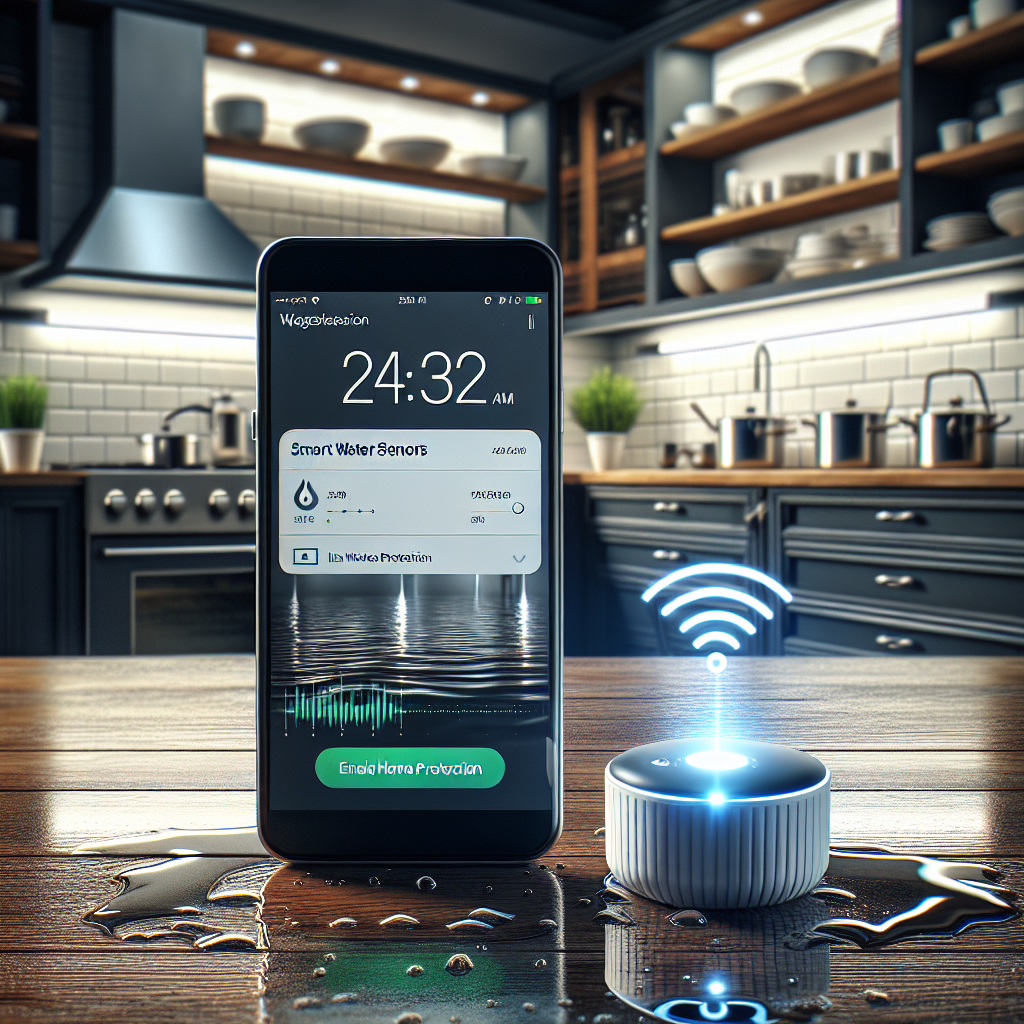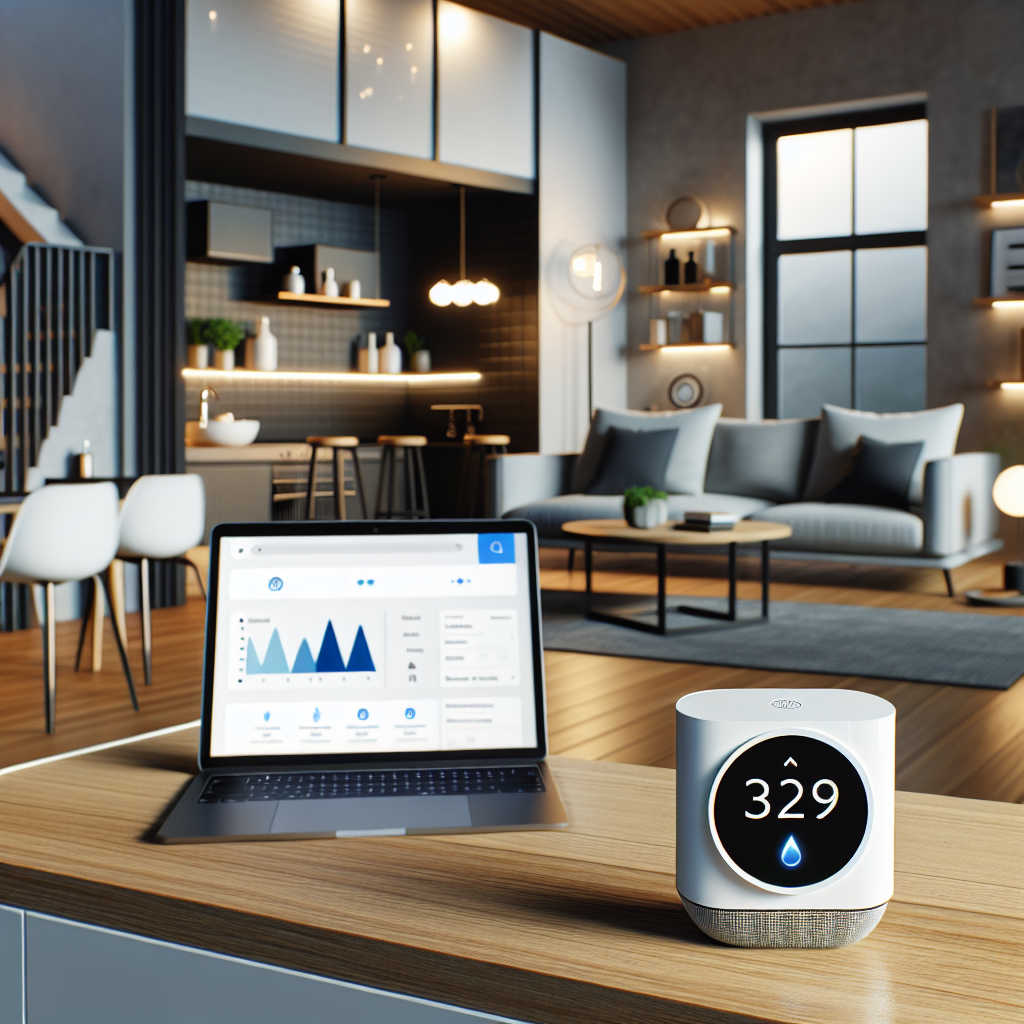In recent years, the advancement of technology has brought about innovative solutions to everyday problems, and one such development is the smart water sensor for insurance. This cutting-edge device is revolutionizing the way homeowners protect their properties from water damage. By detecting leaks and providing real-time alerts, the smart water sensor ensures prompt action can be taken to prevent costly damage. Insurance companies are now encouraging homeowners to install these sensors as a proactive measure to mitigate risks and potentially lower insurance premiums. With the smart water sensor, homeowners can have peace of mind knowing that their homes are safeguarded against unforeseen water damage.
Understanding Smart Water Sensors

Smart water sensors are innovative devices designed to detect and alert homeowners of potential water leaks or flooding in their properties. These sensors are equipped with advanced technology that enables them to monitor moisture levels in real-time, providing an early warning system to prevent water damage.
What are smart water sensors?
Smart water sensors are small electronic devices that can be placed in various locations throughout a home, such as near water heaters, sinks, or appliances that use water. These sensors are designed to detect any abnormal levels of moisture, which could indicate a leak or flooding issue.
How do smart water sensors work?
Smart water sensors typically use a combination of moisture sensors, temperature sensors, and connectivity technology (such as Wi-Fi or Bluetooth) to monitor and transmit data. When the sensors detect an increase in moisture levels beyond the normal range, they send an alert to the homeowner’s smartphone or a central monitoring system. This prompt notification allows homeowners to take immediate action to prevent water damage.
Benefits of using smart water sensors in homes
-
Early detection: Smart water sensors provide early detection of water leaks, allowing homeowners to address issues promptly before they escalate into costly damages.
-
Remote monitoring: With the ability to connect to smartphones or home automation systems, smart water sensors enable homeowners to monitor their properties even when they are away, providing peace of mind.
-
Preventive maintenance: By continuously monitoring moisture levels, smart water sensors help homeowners identify potential issues with plumbing or appliances, allowing for preventive maintenance to avoid future problems.
-
Insurance discounts: Some insurance companies offer discounts to homeowners who install smart water sensors, as they demonstrate a proactive approach to home protection and risk mitigation.
The Technology Behind Smart Water Sensors
- Wireless Connectivity
Smart water sensors utilize wireless connectivity technologies such as Wi-Fi, Zigbee, or Z-Wave to communicate with a central hub or a homeowner’s smartphone. This allows for real-time monitoring and alerts, enabling quick response to any water-related issues detected within the home. The wireless feature also ensures easy installation without the need for complex wiring, making it a convenient solution for homeowners.
- Detection Capabilities
Smart water sensors are equipped with advanced detection capabilities, including the ability to sense water leaks, humidity levels, and temperature fluctuations. Some sensors can even differentiate between types of liquids, such as clean water or sewage. This level of precision in detection helps in early identification of potential water damage risks, allowing for proactive measures to be taken before extensive damage occurs.
- Integration with Home Security Systems
Smart water sensors can integrate seamlessly with existing home security systems, creating a comprehensive smart home ecosystem. By connecting to platforms like Amazon Alexa or Google Assistant, homeowners can receive voice alerts about any water issues detected by the sensors. Integration with security cameras also enables visual confirmation of the problem, enhancing overall home protection. This interconnectedness ensures that homeowners have full control and visibility over their home’s safety, even when they are away.

Importance of Smart Water Sensors for Insurance
Smart water sensors play a crucial role in enhancing home protection and reducing the risks associated with water damage incidents. By detecting leaks or flooding early on, these sensors help homeowners mitigate potential damages and costly repairs. This proactive approach not only safeguards the property but also lowers the likelihood of filing insurance claims, ultimately leading to reduced insurance premiums for policyholders.
Mitigating risks of water damage
Smart water sensors continuously monitor moisture levels in areas prone to leaks, such as basements, bathrooms, and kitchens. By promptly alerting homeowners to any irregularities in water presence, these sensors enable quick response actions to be taken before significant damage occurs. Whether it’s a burst pipe, malfunctioning appliance, or natural disaster, the ability to detect water issues in real-time can prevent extensive destruction to the home’s structure and belongings.
Lowering insurance premiums
Insurance companies recognize the value of proactive risk management in preventing water-related incidents. By installing smart water sensors, homeowners demonstrate their commitment to safeguarding their property, which can lead to reduced insurance premiums. Insurers view these devices as a preventive measure that helps mitigate the frequency and severity of water damage claims, resulting in cost savings for both policyholders and insurance providers.
Enhancing overall home security
In addition to protecting against water damage, smart water sensors contribute to enhancing the overall security of the home. By integrating with smart home systems, these sensors can trigger alarms, notifications, or automated shut-off valves in the event of a water leak or flood. This added layer of security not only alerts occupants to potential threats but also deters intruders or vandals who may attempt to tamper with the property. The peace of mind that comes with knowing that the home is equipped with advanced water sensing technology further reinforces the sense of security and protection for homeowners.
Impact on Insurance Claims Process
Smart water sensors play a pivotal role in revolutionizing the insurance claims process by enhancing efficiency and accuracy. The utilization of these advanced devices brings forth a multitude of benefits that significantly streamline the overall claim filing and investigation procedures, ultimately leading to improved customer satisfaction and cost savings for insurance companies.
- Streamlining claim filing
The integration of smart water sensors allows for real-time monitoring and detection of water leaks or flooding within a home. This instantaneous alert system enables homeowners to swiftly address any potential issues before they escalate, consequently reducing the likelihood of extensive damage. By proactively mitigating risks, the need for filing large-scale insurance claims diminishes, leading to a more efficient and streamlined process for both homeowners and insurance providers.
- Providing accurate data for investigations
One of the key advantages of smart water sensors is their ability to provide precise and detailed data regarding the nature and extent of water damage. This data is invaluable during the claims investigation process, as it offers concrete evidence to substantiate the claim and determine the appropriate coverage. By eliminating ambiguities and inaccuracies often associated with traditional claim assessments, smart water sensors empower insurance companies to expedite the claims processing, resulting in quicker resolutions and payouts for policyholders.
Factors to Consider When Choosing a Smart Water Sensor
When selecting a smart water sensor for insurance purposes to enhance home protection, several key factors need to be carefully considered:
-
Compatibility with existing home systems: It is crucial to ensure that the smart water sensor integrates seamlessly with your existing home automation or security system. This compatibility will allow for centralized monitoring and control, providing a comprehensive approach to safeguarding your property against water damage.
-
Monitoring capabilities: The effectiveness of a smart water sensor lies in its monitoring capabilities. Look for sensors that offer real-time monitoring of water levels, temperature, and humidity in key areas prone to water leaks or flooding. Advanced sensors may also have the ability to track water flow rates and identify patterns that could indicate potential issues.
-
Alert mechanisms for early detection: Timely detection of water leaks or anomalies is essential for preventing extensive damage to your home. Opt for a smart water sensor that offers multiple alert mechanisms, such as smartphone notifications, audible alarms, and email alerts. The ability to customize alert settings based on the severity of the detected issue can help you take immediate action to mitigate damage and minimize insurance claims.
Comparing Different Smart Water Sensor Brands
When evaluating various smart water sensor brands for home protection, it is crucial to consider a range of factors to ensure optimal functionality and reliability.
Features and functionalities
- Brand A offers advanced leak detection technology with real-time alerts sent directly to the homeowner’s smartphone, allowing for immediate action.
- Brand B includes integration with smart home systems, enabling seamless automation and control of water shut-off valves in case of a detected leak.
- Brand C provides multi-sensor capabilities, monitoring not only for leaks but also for changes in humidity levels that could indicate potential water damage.
User-friendly interfaces
- Brand A boasts a simple and intuitive mobile app interface, making it easy for homeowners to set up and customize their sensor settings.
- Brand B offers voice command functionality, allowing users to check the status of their sensors and receive alerts hands-free.
- Brand C provides detailed analytics and reporting features, giving homeowners valuable insights into their water usage patterns and potential risks.
Reliability and accuracy of alerts
- Brand A is known for its high level of accuracy in detecting even minor leaks, reducing the risk of false alarms and ensuring prompt intervention.
- Brand B has a reputation for its reliable alert system, with redundant communication channels to guarantee notifications reach the homeowner without fail.

- Brand C utilizes machine learning algorithms to continuously improve its leak detection capabilities, minimizing the chances of missed or delayed alerts.
Real-Life Applications and Success Stories
Smart water sensors are revolutionizing home protection by detecting leaks and flooding early, potentially saving homeowners from costly damages and insurance claims. Here are some real-life applications and success stories showcasing the benefits of these innovative devices:
- Case Study 1:
-
In a suburban home, a smart water sensor installed in the basement detected a slow leak in the water heater before it escalated into a major flood. The homeowner received an alert on their smartphone and was able to shut off the water supply remotely, preventing extensive water damage. This proactive measure not only saved the homeowner thousands of dollars in repairs but also impressed their insurance company, leading to a reduction in their premium.
-
Case Study 2:
-
A family vacationing overseas had their smart water sensor alert them to a burst pipe in the kitchen. Despite being thousands of miles away, they were able to contact a neighbor to address the issue promptly. The quick response not only limited the water damage but also demonstrated to their insurance provider the effectiveness of smart water sensors in mitigating risks. As a result, the insurance company offered a discount on their policy for utilizing this technology.
-
Insurance Companies Promoting Smart Water Sensors:
- Leading insurance companies are recognizing the value of smart water sensors in preventing water-related disasters. Some insurers are offering incentives such as discounts on premiums or rebates for policyholders who install these devices in their homes. By encouraging the adoption of smart water sensors, insurance companies aim to reduce the frequency and severity of water damage claims, ultimately benefiting both homeowners and insurers.
Tips for Maximizing the Benefits of Smart Water Sensors
-
Regular maintenance and calibration
Smart water sensors require regular maintenance to ensure they are functioning optimally. This includes checking for any physical damage, replacing batteries as needed, and conducting routine calibration tests to guarantee accurate readings. Regular maintenance can help prevent false alarms or malfunctions that could compromise the effectiveness of the sensor in detecting water leaks. -
Understanding insurance policy requirements related to sensors
It is essential for homeowners to familiarize themselves with their insurance policy’s specific requirements regarding smart water sensors. Some insurance providers offer discounts or incentives for installing these sensors, while others may require homeowners to have them in place to be eligible for certain types of coverage. By understanding these requirements, homeowners can ensure they are fully compliant with their insurance policy and maximize any potential benefits or cost savings. -
Integrating sensors with other smart home devices
To enhance the overall protection of their homes, homeowners can consider integrating smart water sensors with other smart home devices. For example, connecting water sensors to a smart home hub or security system can enable real-time alerts and notifications in the event of a water leak, allowing homeowners to take immediate action to mitigate potential damage. Integrating sensors with other smart devices can also provide a more comprehensive and interconnected approach to home protection.
Future Trends in Smart Water Sensor Technology
- Advancements in sensor accuracy
In the realm of smart water sensor technology, one of the most prominent future trends revolves around the continuous enhancements in sensor accuracy. Manufacturers are investing in research and development to fine-tune the precision of these sensors, enabling them to detect even the slightest variations in water levels or leaks within a home. By improving accuracy, these sensors can provide real-time data that is reliable and actionable for homeowners and insurance companies alike.
- Integration with artificial intelligence for predictive analysis
Another significant future trend is the integration of smart water sensors with artificial intelligence (AI) algorithms for predictive analysis. By leveraging AI capabilities, these sensors can not only detect water-related issues but also forecast potential risks based on historical data and patterns. This proactive approach allows for early intervention and preventive measures to be implemented, reducing the likelihood of significant water damage occurring in a home. Insurance providers can benefit from this predictive analysis by offering tailored coverage plans that incentivize homeowners to adopt smart water sensor technology.
- Potential collaborations between insurance providers and sensor manufacturers
Looking ahead, the future of smart water sensor technology also entails potential collaborations between insurance providers and sensor manufacturers. These partnerships can lead to the development of customized sensor solutions that align with the specific needs of insurance companies, such as streamlined data sharing for claims processing or enhanced risk assessment capabilities. By working together, insurers and sensor manufacturers can create innovative products and services that not only enhance home protection but also optimize the insurance coverage offered to homeowners.
FAQs: Smart Water Sensor for Insurance: Enhancing Home Protection
What is a smart water sensor for insurance?
A smart water sensor for insurance is a device that is used to monitor water levels in your home and detect any potential leaks or flooding. This device is connected to a mobile app or a central monitoring system that alerts homeowners and insurance companies in case of any water damage, helping to prevent costly repairs and potential insurance claims.
How does a smart water sensor help in enhancing home protection?
By installing a smart water sensor in your home, you can proactively monitor and detect water leaks or flooding before significant damage occurs. This early detection helps to minimize the risk of water damage to your home and belongings, ultimately reducing the likelihood of insurance claims or costly repairs. Additionally, insurance companies may offer discounts or incentives for homeowners who invest in smart water sensor technology.
Can a smart water sensor save homeowners money on insurance premiums?
Yes, a smart water sensor can potentially save homeowners money on insurance premiums. By investing in smart technology that helps prevent water damage, insurance companies may view homeowners as less risky and offer lower premiums. Some insurance providers even offer discounts or incentives for homeowners who use smart water sensors as a proactive measure to protect their homes from water damage.
How easy is it to install and use a smart water sensor?
Most smart water sensors are designed for easy installation and user-friendly operation. Homeowners can typically set up the device themselves by following the manufacturer’s instructions or seeking assistance from a professional installer. Once installed, the smart water sensor can be easily monitored through a mobile app or connected to a central monitoring system for real-time alerts and notifications in case of any water issues.
Are there any privacy concerns with using a smart water sensor for insurance?
Like any smart home device, there may be privacy concerns with using a smart water sensor for insurance. Homeowners should ensure that the device and app they choose have proper security measures in place to protect their data and personal information. It is also important to review the privacy policy of the manufacturer and understand how your data may be used or shared with insurance companies.